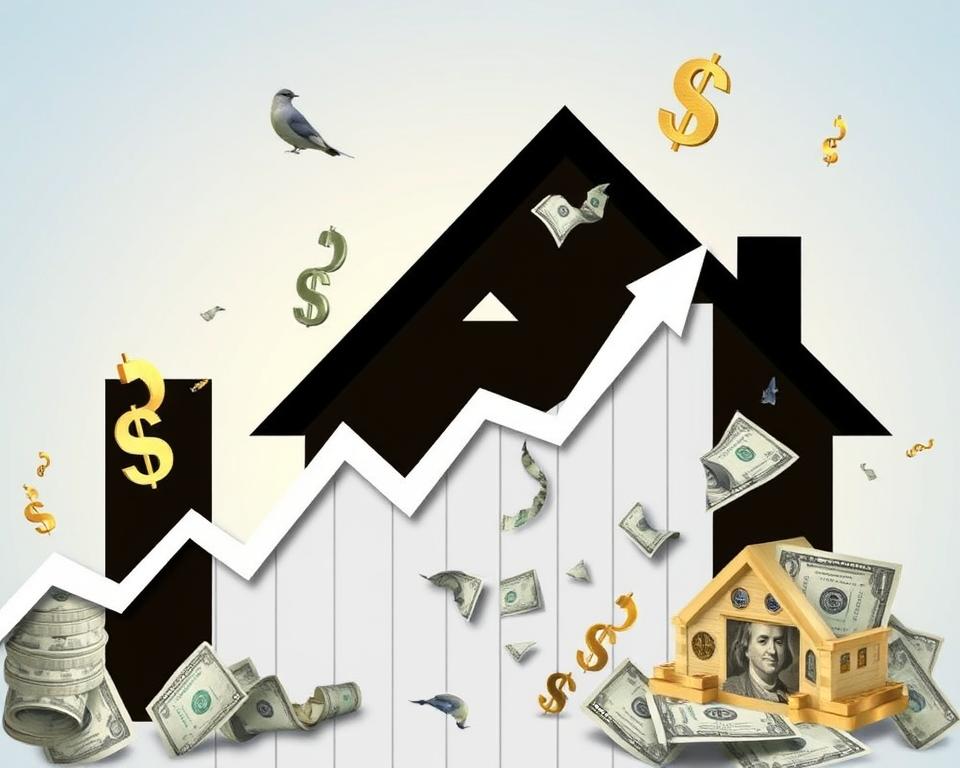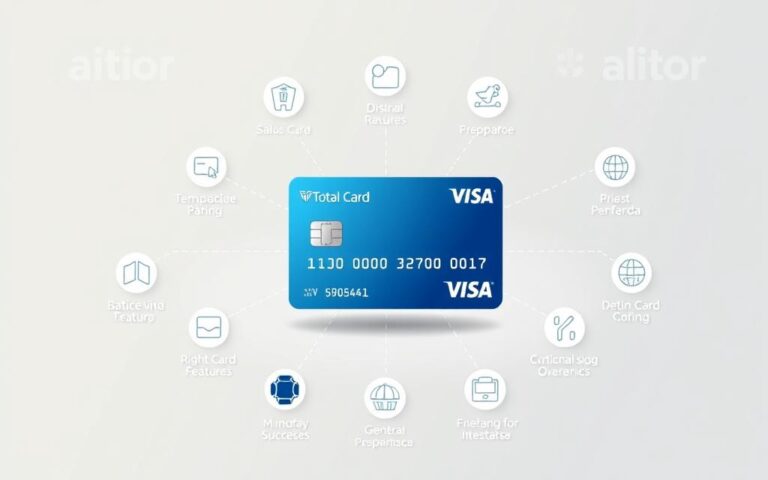Advertisement
Did you know getting five mortgage quotes can save borrowers a lot? Research by Freddie Mac shows it can save $1,200 or more during the loan’s life. Right now, mortgage rates are near 6%. People looking to buy a home might think about waiting for lower rates. But, it’s important to know about different home loans, check your credit, and compare lenders to get the best rates.
We will show you how to save the most money. This includes tips on refinancing, understanding market conditions, and how mortgage products differ. By the end, you’ll know how to work through the mortgage world in 2024 effectively.
Understanding Mortgage Rates
Mortgage rates are crucial in the home buying process. They heavily affect your monthly payments and the total loan cost. Knowing about these rates helps you make smart financial choices.
What are Mortgage Rates?
Mortgage rates show the cost of borrowing money to buy a house. They are shown as a percentage of the loan. The rate you get varies due to market conditions and your finances. For instance, a 2.6% rate means lower monthly payments than a 7.2% rate or the high 18.3% in 1981.
How Mortgage Rates are Determined
Many things influence mortgage rates. This includes the Federal Reserve’s rate changes and inflation. The prime rate also affects mortgage costs, usually being 3% above the federal funds rate. Moreover, the yield on 10-year Treasury bonds indicates consumer interest rates, which lenders then use.
Importance of Timing in Mortgage Rates
Choosing the right time for your mortgage application is key. Locking in a rate during a good market can save a lot over the loan’s life. Right now, average rates are just under 7%. Being strategic with timing can lead to lower APRs quickly.
Factors Affecting Mortgage Rates
Getting a great mortgage deal means understanding what affects rates. There are key factors that play a role. Your credit score, the type and amount of your loan, and market conditions are crucial.
Credit Score’s Role
Your mortgage rates are closely tied to your credit score. This score ranges from 300 to 850. High scores mean lower interest rates. If your score is above 740, you’re likely to get much better rates than with a score under 620. So, a good credit score can lead to big savings on interest.
Loan Amount and Type
The size and type of your loan impact your rates. Lenders have different rates for different loan structures. Fixed-rate mortgages usually offer different rates than adjustable-rate mortgages (ARMs). ARMs can change, based on wider market indexes like the SOFR.
Market Conditions
Market conditions also play a big part in setting mortgage rates. A strong economy often raises rates, whereas a weaker one may lower them. Rates have been around 6.5-7.3% lately. Employment rates, inflation, and Federal Reserve actions affect these numbers. Watching these factors can help you decide when to apply for a mortgage.
| Factor | Impact on Mortgage Rates |
|---|---|
| Credit Score | Higher scores lead to lower rates |
| Loan Amount | Larger loans may have varying rates |
| Loan Type | Difference in rates between fixed and adjustable |
| Market Conditions | Rates vary with the economic landscape |
| Down Payment | Higher down payments often yield better rates |
The Impact of Inflation on Mortgage Rates
It’s important to know how inflation and mortgage rates are connected. Inflation affects interest rates, which changes how much borrowing costs. If inflation goes up, mortgage rates often do too. This makes buying a home more expensive for you.
How Inflation Influences Rates
Inflation reduces the value of money over time. This makes lenders ask for higher interest rates. For example, when inflation hit 8.5% in March 2022, mortgage rates also went up. The rate for a 30-year mortgage reached 5%, which is a big jump compared to the past.
Historical Trends in Inflation and Rates
Looking at history, inflation and the cost of mortgages are linked. When inflation is high, interest rates go up. This makes it harder to find affordable homes. The COVID-19 pandemic caused prices to rise, making this issue worse.
Things like politics can also make inflation worse. When the Fed raises rates to fight inflation, mortgage rates also increase. Knowing these trends helps you make smart choices about buying a home.

Types of Mortgage Loans
It’s important to pick the right mortgage loan, as it affects your monthly payments and financial future. Different loans work for different people, offering benefits that match their needs. Knowing the differences between Fixed-Rate Mortgages, Adjustable-Rate Mortgages, and Government-Backed Loans helps you choose wisely.
Fixed-Rate Mortgages
Fixed-Rate Mortgages are chosen for their stability. The interest rate stays the same for the loan’s lifetime, either 15 or 30 years. This makes budgeting easier since your monthly payments won’t change. Even if Adjustable-Rate Mortgages offer lower rates initially, the certainty of fixed payments may be more valuable.
Adjustable-Rate Mortgages
Adjustable-Rate Mortgages (ARMs) have low initial rates that can change based on the market. This means your early payments can be lower, but they might increase later. Before choosing an ARM, think about your ability to handle future payment increases if rates go up.
Government-Backed Loans
Government-Backed Loans include options like FHA, VA, and USDA loans, aimed at specific groups. FHA loans help those with lower credit scores and require only 3.5% down. VA loans offer benefits to veterans and servicemembers, like no down payment. USDA loans help buyers in rural areas, also without needing a down payment, making it easier for lower-income families to buy homes. These programs help reduce the barriers to homeownership.
| Loan Type | Key Features | Ideal For |
|---|---|---|
| Fixed-Rate Mortgages | Stable interest rate, predictable payments | Risk-averse borrowers preferring long-term planning |
| Adjustable-Rate Mortgages | Lower initial rates, potential for payment increases | Borrowers expecting stable income, planning to move before adjustments |
| Government-Backed Loans | Low down payments, specific eligibility criteria | First-time buyers, veterans, or rural area residents |
How to Improve Your Credit Score
Your Credit Score is vital for Home Loans. It helps you get better financing options and rates. Knowing how to raise your score can be very beneficial.
Tips for Faster Credit Improvement
To boost your Credit Score, there are key steps to take:
- Maintain low credit utilization: Try to use under 30% of your credit limits.
- Make payments on time: On-time payments form 35% of your FICO score, so they’re crucial.
- Reduce outstanding debts: Cutting down debt can improve about 30% of your score.
Importance of Credit History
Your Credit History shows lenders if you’re a good borrower. A strong history means better loan deals. Most regular loans need a score of 620, but FHA loans can go as low as 580. A solid Credit History is key to good financing.
Regular Credit Report Check
Checking your credit regularly is important. It helps find mistakes that could lower your score. Getting your credit report every year lets you fix any errors quickly.
| Loan Type | Minimum Credit Score | Down Payment |
|---|---|---|
| Conventional Loan | 620 | Varies |
| FHA Loan | 580 | 3.5% down payment; 500 with 10% |
| USDA Loan | 640 | No down payment |
| VA Loan | 620 (varies by lender) | Varies (generally no minimum) |
Choosing the Right Lender
Picking the right lender is key to your mortgage results. There are many options out there, so doing your homework matters. Know how to weigh your choices, learn about the fees, and think about using community banks or credit unions. This will help you make smart choices.
Comparing Lenders
It pays to look around for the best deal. Check out what at least three lenders or brokers offer. You’ll find various interest rates and terms. This could save you a lot of money over time. Credit unions and community banks often have good deals, so don’t overlook them.
Understanding Lender Fees
Knowing the fees lenders charge is very important. The main fees are:
- Application fees
- Origination fees
- Underwriting costs
- Closing costs
Bargaining on these fees can lighten your financial load. Lenders must give you a loan estimate within three days of applying. This lists all the fees. Use this info to compare different lenders smartly.
The Role of Community Banks and Credit Unions
Community banks and credit unions are key players in the mortgage game. The U.S. has more than 5,100 federally insured credit unions. Many offer lower rates and fees than big banks. They focus on customer service and provide custom mortgage plans. This is great if you want flexibility. They often give out more than half of their loans as mortgages. This shows their big role in lending.

Preapproval vs. Prequalification
When you’re looking to buy a house, knowing the difference between preapproval and prequalification is key. Each one has its own role in showing where you stand as a hopeful homeowner. They shape how you deal with interest rates and impact your buying journey.
What’s the Difference?
Prequalification is your first step. It gives an idea of the loan amount you might get. It uses basic info you provide without a deep credit check. Preapproval goes deeper by checking your full financial background. This step wants details like pay stubs and does a thorough credit check, offering you a clearer loan promise. This way, you can house-hunt with sureness.
Benefits of Preapproval
Getting preapproved has big pluses. It shows sellers you mean business and have the funds. This edge makes your bids stand out, especially in busy markets. And it helps you negotiate better, as sellers prefer dealing with sure buyers.
How to Get Prequalified
Starting prequalification is easy. You gather some basic financial facts, then talk to lenders. They’ll ask about your job, how much you spend, and what loan you’re after. This quick step lets you gauge what you might afford without needing tons of paperwork.
| Aspect | Prequalification | Preapproval |
|---|---|---|
| Documentation Required | Basic financial information | Extensive financial documents |
| Credit Check Type | Soft credit check | Hard credit check |
| Loan Amount Confidence | Estimated amount | Specific loan amount |
| Time to Complete | 1 to 3 days | Minutes to a few business days |
| Weight in Offers | Less weight in negotiations | More weight, credible commitment |
The Mortgage Application Process
The mortgage application process might seem scary. But knowing what comes next can make things less stressful. Focus on required documents, understanding closing costs, and avoiding mistakes.
Required Documentation
Gathering the right documents is crucial for your mortgage application. You’ll need:
- Financial statements
- Tax returns
- Employment verification
Having the right documents helps lenders check your finances. A complete set speeds up the process.
Understanding Closing Costs
Closing costs are important to understand in your mortgage journey. These costs are a part of buying your home. They can be 2% to 5% of the home’s price:
- Title insurance
- Appraisal fees
- Attorney charges
Knowing these costs helps you plan your budget. This way, there are no surprises later on.
Avoiding Common Application Mistakes
Making mistakes can slow down your application. Some common errors include:
- Providing inaccurate information
- Submitting documentation late
- Failing to disclose debts or assets
Double-check everything and keep track of deadlines. This helps avoid issues and makes the process smoother.
Shopping Around for the Best Rates
Looking for the best mortgage rates can seem hard, but it’s worth it for the savings. It’s key to learn about Mortgage Brokers, use online tools for rate comparisons, and understand Rate Locking. These steps are crucial in finding a good mortgage.
Using a Mortgage Broker
A Mortgage Broker acts as your guide to lenders. They make finding good offers easier, possibly with better rates and fees. This is because they know a lot of lenders and can get deals you might not find on your own.
Online Rate Comparisons
Using the internet to compare rates can quickly show you different options. Tools like mortgage calculators help review many offers at once. This helps you make a smart choice that matches your budget. Saving even a little, like 0.5%, on interest makes a big difference over time.
The Importance of Rate Locking
Think about locking in your interest rate when you’re about to choose a mortgage. This step keeps your rate from going up before you finish the loan process. Knowing how long you can lock the rate and its costs is important. Remember, some lenders might charge you for this service, so it should fit your overall mortgage plan.
| Comparison Factor | Using a Mortgage Broker | Online Rate Comparisons | Rate Locking |
|---|---|---|---|
| Expert Guidance | Yes | No | No |
| Speed of Quotes | No | Yes | No |
| Rate Protection | No | No | Yes |
| Potential Savings | High | Medium | Varies |
Negotiating Your Mortgage Rate
Negotiating your mortgage rate is crucial for a better financial future. Knowing effective strategies gives you confidence. You can focus on certain factors to improve your relationship with the lender.
Effective Strategies for Negotiation
Getting quotes from different lenders helps secure lower rates. Many miss out by accepting the first offer. Showing you’re a good risk strengthens your position.
You can use offers from other lenders for a better deal. Some fees, like underwriting and application costs, can be negotiated. Knowing which fees can’t be changed sets realistic expectations.
Knowing When to Walk Away
Walk away if terms don’t match market standards or won’t negotiate. Don’t let pressure sway you. Stay true to your budget and goals. Looking elsewhere might find you a better deal.
Building a Relationship with Your Lender
A good relationship with your lender is beneficial. It could lead to better service and lower fees. Banks value reliable customers. Those who pay on time negotiate better terms easier.
| Key Strategies | Description |
|---|---|
| Obtain Multiple Quotes | Secure various offers to strengthen your negotiating position. |
| Demonstrate Creditworthiness | Show solid credit history and financial responsibility to earn better rates. |
| Negotiate Fees | Focus on reducing origination, underwriting, and other service fees. |
| Know When to Walk Away | Be prepared to explore other options if terms do not meet your criteria. |
| Build Strong Lender Relationship | Fostering good communication can lead to better service and terms in the future. |
Staying Informed on Market Trends
Knowing about market trends is key when thinking about mortgages. It’s important to look at economic indicators. Things like GDP growth rates and job data often hint at mortgage rate changes. By keeping up with this info, you can pick the best time to get a mortgage.
Following Economic Indicators
Economic indicators give clues about where mortgage rates might go. Figures on inflation and how much people are spending play a big part. The connection between jobs and loan costs shows why it’s crucial to watch the economy. It helps you choose wisely when it comes to your mortgage.
Keeping an Eye on Federal Reserve Decisions
The Federal Reserve’s decisions are big for mortgage rates. Knowing what the Fed thinks about interest rates helps you plan your mortgage timing. They might work to grow the economy or fight inflation, affecting the market. Staying updated on their moves can help you find the best mortgage rates.
Resources for Current Mortgage Rates
Using trusted sources for the latest mortgage rates is smart. Sites like Bankrate and Zillow offer up-to-date comparisons. This lets you keep an eye on rate changes. With rates always changing, these tools help you make the best moves for competitive rates.



